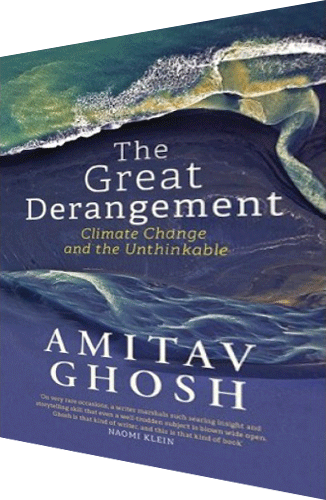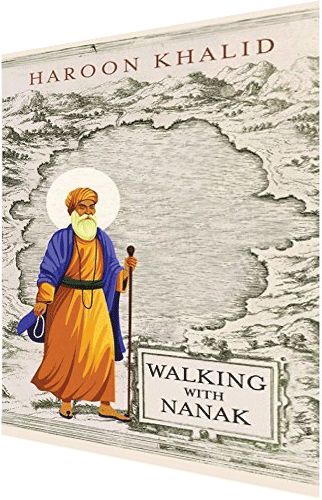The Great Derangement: Climate Change and the Unthinkable, Amitav Ghosh, Penguin Random House ; Rs.399 ;Pages 275
 After winning global acclaim for his path-breaking Ibis trilogy — Sea of Poppies (2008), River of Smoke (2011) and Flood of Fire (2015) — historical fiction novels which focused scathingly on the impact of commerce-driven Western imperialism on Asia, especially China and the Indian diaspora of the 19th century, celebrated US-based (but currently residing in Goa) writer Amitav Ghosh’s latest book is on the scary issue of climate change endangering Planet Earth.
After winning global acclaim for his path-breaking Ibis trilogy — Sea of Poppies (2008), River of Smoke (2011) and Flood of Fire (2015) — historical fiction novels which focused scathingly on the impact of commerce-driven Western imperialism on Asia, especially China and the Indian diaspora of the 19th century, celebrated US-based (but currently residing in Goa) writer Amitav Ghosh’s latest book is on the scary issue of climate change endangering Planet Earth.
Not that this prolific Doon School, St. Stephen’s, and Oxford-educated novelist is new to writing non-fiction. Previous works of non-fiction include In an Antique Land (1992), Dancing in Cambodia and at Large in Burma (1998), Countdown (1999), The Imam and the Indian (2002) and Incendiary Circumstances (2006).
Ghosh’s new oeuvre is an analysis of the cultural, historical and political repercussions of global warming, the impact of which is being experienced on an everyday basis by all worldwide — except America’s new president. “There never was a time,” writes Ghosh, “when the forces of weather and geology did not have a bearing on our lives — but neither has there ever been a time when they have pressed themselves on us with such relentless directness.”
Despite this, purveyors of literature, history, politics and culture have not responded to the imminent catastrophe with any urgency. Indeed Ghosh finds the present day establishment complicit in “modes of concealment,” and warns they will have to answer future generations.
The focus in the first section of the book, ‘Stories’ is on the novel as a genre and its inadequate interface with climate change. Spanning a range of fiction writers including himself, Ghosh argues that since the late 19th century, realistic fiction has operated within paradigms of probability and individual moral concerns. Several freak natural disasters were considered too melodramatic to find a place in fiction.
Drawing on his reading of Jane Austen, Gustave Flaubert, and Indian writer Bankim Chandra Chatterjee, Ghosh shows that the novel had adapted to the regularity of bourgeois life. The two key issues that he handles in this section are how the novel can re-emerge in new generic variations like sci-fi, and how it is imperative to address climate change concerns collectively through literary fiction.
The author is also appalled by global complacency about urban planning. Indiscriminate colonisation in the post 17th century which created colonial cities such as Mumbai and Chennai, New York and Charleston showed “reckless disregard” for traditional knowledge about ecology management. Therefore, disasters are just waiting to happen.
Irregular warming, cyclones and hurricanes, tsunamis and deluges will play havoc with civic systems and urban cityscapes, a prophecy already proven by cyclone Sandy in New York in 2012, and the deluges in Mumbai, Chennai and Kolkata between 2005-2015. Across time and space, the global and the local, continuities of experience highlight the author’s critique of human apathy towards climate derangement worldwide.
Ghosh compellingly argues that the root cause of the growing distance between human beings and the environment lies in Cartesian dualism. Age-old wisdom embedded in ancient religion and primitive custom, epic narration and folklore about non-human agencies can only be re-established by an awareness of the magnitude of these forces.
In the second section of the book, while tracing the ‘history’ of this contemporary crisis, Ghosh takes a postcolonial stance and identifies capitalism and imperialism as “drivers of climate change”. He views global warming “through the prism of empire” and explores several implications that cut into a predominantly Eurocentric discourse. But currently, Asia occupies a central position in the global discourse on the carbon economy.
The Asian landmass is most vulnerable to the vagaries of climate change — droughts, flooding, water crises, rising sea levels and other freak weather aberrations. Their impact translates into major human disasters because of density of population. Ironically, transfer of western technology, industrialisation and consumerism were 19th and 20th century ‘benefits’ which have not brought progress but the Great Derangement, trapping Asia and its population in Westernised modernity that is self-defeating. Ghosh supports scholars who conjecture that precolonial knowledge systems already had multiple, alternative versions of modernity that were practiced in Asia — in China and Japan, Burma and India.
Injustice and poverty in Asia are, in the author’s opinion, rooted in the complex history of the carbon economy introduced by European colonialism. Unequal distribution of wealth — an inevitable consequence of the Western development model — has short-changed the great majority of people of Asia and the developing world.
This argument slips easily into the last part of the book, ‘Politics’ and how the most powerful challenge that climate change poses is to the idea of freedom. Ironically, being independent of Nature was as powerful an idea as escape from injustice, oppression and inequality. The author is convinced that “we have never been free of non-human constraints” but it’s imperative to modify or come to terms with “conceptions of history and agency”.
This theme has been ignored in art and literature because of the 20th century establishment’s reluctance to engage with it. Increasingly, freedom is being equated with withdrawal from the material world and environment into human interiority and consciousness. Drawing examples from across the globe, from varied time frames and contexts, the author demonstrates how in several countries including India, political energy has been channeled into questions of identity and religion, caste and ethnicity, language and gender rights, but not into the ecological crisis threatening the planet. This would require a radical change in the very nature of politics.
One of the gravest issues of our age, the Great Derangement explored intensely by Ghosh, compels us to look for solutions. One way is to move beyond individual concern to collective moral responsibility. Formal political structures of nation states and transnational groupings make it difficult for them to rise above geo-political rivalries. Optimistically, Ghosh believes the “upsurge of secular protest movements around the world” can bring about fundamental changes. The only problem is that humanity is sitting on a time bomb and the minutes and seconds are ticking away, issuing urgent summons to the great apocalypse.
The book is a timely warning about the frightening outcome of Planet Earth’s multiplying carbon footprints.
Jayati Gupta
Lonely apostle
Walking with Nanak, Haroon Khalid, Tranqebar Press; Rs.699 ; Pages 321
 Islamabad-based academic and journalist Haroon Khalid has a particular passion — to highlight little-known aspects of Pakistan’s pre-Islamic past and the plight of the country’s marginalised religious minorities. In his earlier books A White Trail: Journey into the Heart of Pakistan’s Religious Minorities (2013) and In Search of Shiva: A Study of Folk Religious Practices in Pakistan (2016), he discusses these important issues. In this latest book Khalid provides us glimpses and insights into the rich Sikh heritage of what is now Pakistan.
Islamabad-based academic and journalist Haroon Khalid has a particular passion — to highlight little-known aspects of Pakistan’s pre-Islamic past and the plight of the country’s marginalised religious minorities. In his earlier books A White Trail: Journey into the Heart of Pakistan’s Religious Minorities (2013) and In Search of Shiva: A Study of Folk Religious Practices in Pakistan (2016), he discusses these important issues. In this latest book Khalid provides us glimpses and insights into the rich Sikh heritage of what is now Pakistan.
Guru Nanak (1469-1539) was born — and died — in what is today Pakistani Punjab. Together with his disciple Bhai Mardana, he travelled widely in the Punjab and far beyond, disseminating the message he had been commissioned by God to convey to humankind. In Walking With Nanak, Khalid takes his readers on a long journey across latter day Pakistan — Punjab as well as the southern Sindh province — where the Guru walked and mentored the multitudes, and where devotees established gurdwaras (Sikh shrines) in his memory.
As readers accompany Khalid on his travels, he narrates incidents from the life of Guru Nanak and his successor gurus whom the Sikhs (as well as many others) revere, spreading their universal message of peace and harmony, and core tenets of their teachings. In the process, we learn about Guru Nanak’s devotion to God, and of his mission to unite people of different faiths in common devotion to One God, because of which many Hindus and Muslims revere him to this day.
We also learn that he transcended religious labels and identities that hinder one from realising God, of his rejection of supremacism, bigotry, exclusivism, communalism, priestcraft, caste discrimination and superstition under the guise of religion, of his opposition to religious ritual and dogma and his love for the poor and meek. Guru Nanak’s message was to always remember the infinite God and to guard one’s self from becoming too immersed in worldly concerns and desires. Five centuries after Guru Nanak’s death the issues that concerned him are alive and relevant today.
Khalid has an academic background in anthropology and a deep understanding of several religious traditions. He combines this with love for travel and adventure to produce this richly sourced inquiry into Pakistan’s Sikh heritage. Not very long ago, this part of the world hosted a large Sikh population. But in the disastrous aftermath of Partition, most Sikhs were forced out of their homes and hearths and migrated to India, while many others (like vast numbers of Hindus and Muslims) were slaughtered in communal frenzy.
They consecrated, in what became Muslim-majority Pakistan, scores of gurdwaras, but only a minuscule Sikh population remained. Khalid records the history of these shrines and descriptions of their present condition.
Many of them, he says, are crumbling ruins; some converted into schools while others have been occupied by refugees from India and turned into homes. Some have been ‘Islamised’ into Muslim-style shrines. Nevertheless, a few continue to function as gurdwaras. The author also narrates his interactions with Sikhs he gets to meet during his journey, and the difficulties they experience as minorities in contemporary Pakistan.
This book is the result of much hard work, as also a labour of love. Given the power and influence of Islamic extremists who dominate the public discourse in Pakistan, and widespread discrimination against non-Muslim minorities (which successive governments have tacitly, if not overtly, endorsed), documenting and celebrating the cultural histories of Pakistan’s religious minorities and championing inter-community harmony, hasn’t made the author popular with the Pakistan establishment or close relatives.
“Often,” he relates, “my family members, my students and my friends say in a derogatory manner that I am a Hindu or a Sikh, implying that I was somehow inferior to them. My mother and sisters have told me several times to write about Muslim saints and buildings instead of our Sikh or Hindu heritage. In a country where everyone is researching Islam, it seems there is no space to do any research outside the fold of Islam.”
Scholars and historians may well differ with Khalid on his views on certain aspects of Sikh history. But they are unlikely to dispute his love for Nanak and his passion for promoting peace, harmony and religious pluralism.
Roshan Shah